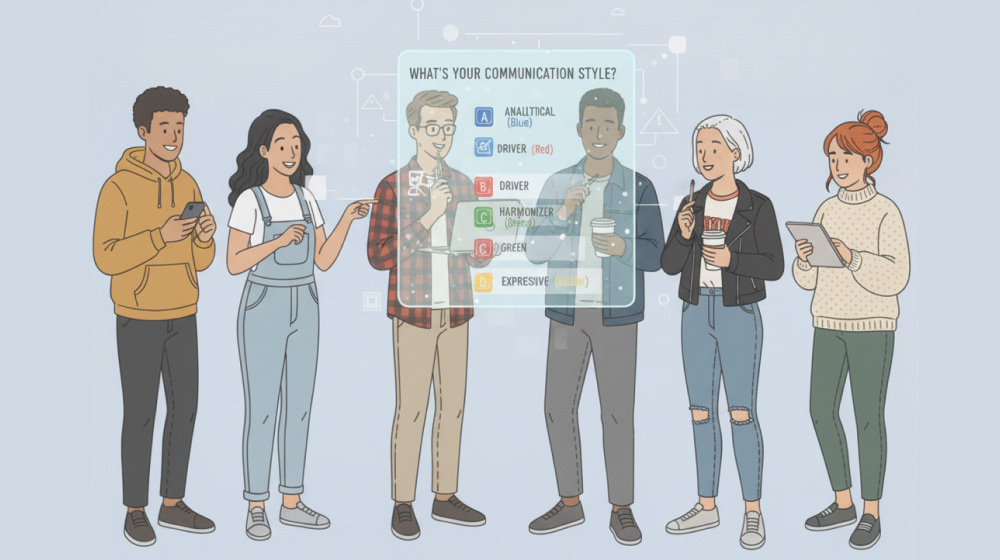
From Gut Feeling to Measurable Communication
Beyond gut feeling, a communication style quiz gives a structured snapshot that makes intangible habits observable and coachable. These instruments help participants identify default tendencies, situational shifts, and stress responses that influence message clarity and rapport. Teams gain a shared vocabulary to discuss collaboration norms without blame, and leaders gain insight into how to tailor guidance for different personalities. For individuals, the outcome often feels like a mirror that balances affirmation with actionable next steps for growth and clarity.
Master Your Communication
In many organizations, a communication styles quiz serves as a baseline for onboarding, coaching, and career development planning. Data-informed insights can illuminate mismatches between intention and perception, which simplifies conflict resolution and expectation-setting. When paired with feedback, even small vocabulary changes can recalibrate how others interpret urgency, empathy, and decisiveness. For learners who prefer a fast start, a communication quiz functions as a catalyst for targeted practice.

- 1Clarifies interpersonal strengths and growth areas without vague labels
- 2Provides a common language for feedback that reduces defensiveness.
- 3Supports evidence-based coaching and measurable skill development.
- 4Improves alignment in cross-functional projects and client communications.
Improve How You Speak, Listen, and Connect
To interpret trends accurately, a DISC quiz typically maps behavior across dominance, influence, steadiness, and conscientiousness, revealing how speed and focus shift communication tone. Valid tools avoid stereotyping by describing ranges and blends rather than fixed boxes or simplistic labels. When participants receive brief narratives and scenario-based tips, they translate results into real actions faster. For those seeking immediate clarity on practical applications, a what is your communication style quiz often connects patterns to everyday meetings, feedback exchanges, and presentations.

What Is Your Communication Style?
Reliability matters, so look for instruments with transparent methodology and helpful comparisons across roles or industries. To reinforce learning, an effective communication quiz usually adds targeted prompts, reflection exercises, or practice scripts that align guidance with specific results. Over time, combining self-assessment with peer input builds a multi-angle view that exposes blind spots. Habit tracking, coaching check-ins, and scenario rehearsals help participants move from awareness to durable skills that hold up under pressure.
4 Styles of Communication: Comparison of Models
For readers comparing options, many communication style quizzes integrate typologies with coaching tips, giving immediate next steps for meetings, emails, and negotiations. To streamline your evaluation, the matrix below contrasts several widely used approaches on practical dimensions. Consider how your team communicates under pressure, across functions, and with clients, then choose a model whose strengths match your context. The aim is not to chase novelty, but to gain a stable map that clarifies behavior in the moments that matter.
| Model | Primary Focus | Strengths | Watch-outs |
|---|---|---|---|
| DISC | Observable behavior: pace and priority | Easy to learn, highly actionable | Can oversimplify blends without coaching |
| Social Styles | Assertiveness and responsiveness | Great for sales and client dynamics | Needs nuance for complex team contexts |
| MBTI | Cognitive preferences and energy | Rich language for reflection | Less focused on overt behavior |
| Big Five | Trait dimensions with ranges | Strong research foundation | May feel abstract for daily tactics |
Leaders seeking a concise entry point often prefer a 4 styles of communication quiz because it condenses decision-making into a quick, memorable map for day-to-day collaboration. In contrast, coaches may layer several frameworks to balance quick wins with deeper insight. Regardless of the model chosen, the payoff grows when teams practice adaptation, document norms, and revisit agreements after major milestones to cement better habits.
Find Your Voice With a Communication Type Quiz
For role-specific development, a communication type quiz can highlight which contexts demand adaptation, such as customer escalations or executive briefings. Managers who anchor coaching in behaviors rather than assumptions reduce defensiveness and improve commitment to change. When self-insight is paired with clear practice reps, people learn to flex without losing authenticity. For individuals seeking personal clarity, a what is my communication style quiz often sparks an “aha” moment that connects recurring challenges with workable solutions grounded in everyday routines and scripts.

Career mobility improves when professionals can translate style into audience-centered choices. Presenters who blend data with narrative learn to vary depth based on time and stakes. Cross-functional collaborators thrive when they match their message to the receiver’s priorities, which minimizes noise and maximizes traction. For broader self-awareness, a personality style quiz can add a complementary perspective, helping people reconcile inner preferences with outward signals to communicate with intention.
- 1Turn insights into concrete micro-habits for meetings and emails
- 2Use reflection prompts after tough conversations to refine your playbook.
- 3Align team norms with client expectations for smoother delivery.
For ongoing calibration, a communication skills quiz can serve as a periodic pulse-check that anchors coaching conversations in evidence rather than memory. If budget is tight, a free communication style quiz can still deliver quick wins when paired with deliberate practice and reflective journaling. When the goal is external agility, a social style quiz encourages perspective-taking so you can tailor tone, speed, and detail to the other person’s comfort zone during high-stakes discussions without losing your own voice in the process.

- 1Focus on one behavior change at a time and measure results.
- 2Use peer feedback to validate what’s working in real contexts.
- 3Schedule short, high-frequency practice reps to build automaticity.
- 4Document personal playbooks to make improvements repeatable.
Boost Empathy and Focus With a Communication Quiz
Listening amplifies every other skill, and structured prompts help you avoid defaulting to reply mode. After meetings, note where you interrupted, summarized, or asked clarifying questions, and set one improvement target for the next interaction. To sharpen this muscle, a listening styles quiz can spotlight patterns that affect comprehension and empathy in complex conversations. Pair that insight with a simple checklist, pause, paraphrase, probe, to transform attention into understanding that others can feel and trust consistently.
Frequently Asked Questions
- How accurate are style assessments compared to real-world behavior?
Good instruments approximate patterns, not destinies. Treat results as a starting hypothesis and validate with peer feedback, observation, and performance outcomes. The closer the scenarios resemble your daily contexts, the more useful and predictive the guidance becomes for decisions and relationship dynamics.
- Can my style change over time or across situations?
Core preferences tend to remain stable, but behavior is highly contextual. Stakes, time pressure, and audience can shift how you express or prioritize information. Skill development expands your range so you can adapt without abandoning authentic strengths or values in demanding moments.
- Should teams use one model or combine several?
Use one shared framework for everyday coordination to keep language simple and actionable. Complement it with deeper models when coaching or leadership programs need nuance. The key is consistency: align practices, artifacts, and training with the primary map to avoid confusion and fragmentation.
- What’s the best way to debrief results with a manager or coach?
Arrive with specific examples and one meaningful goal tied to upcoming work. Ask for observations about impact, not just intention, and co-create micro-habits you can test within two weeks. Close the loop by reviewing evidence, emails, recordings, or feedback, to track progress objectively.
- How can I apply insights quickly without overwhelming myself?
Pick one recurring moment, status updates or stakeholder check-ins, and define a single behavior to change, such as pacing or questioning. Practice deliberately, solicit targeted feedback, and iterate. Small, sustained adjustments beat large, sporadic shifts for building durable communication excellence.
The Latest News
Please Note
This website (communication-style-quiz.com) is not an official representative, creator or developer of this application, or product. All the copyrighted materials belong to their respective owners. All the content on this website is used for educational and informative purposes only.



